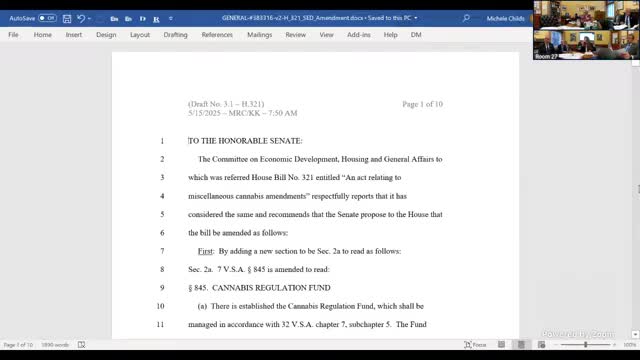Cannabis Control Board Discusses Fee Realignment and Revenue Implications
May 16, 2025 | Economic Development, Housing & General Affairs, SENATE, Committees, Legislative , Vermont
This article was created by AI summarizing key points discussed. AI makes mistakes, so for full details and context, please refer to the video of the full meeting. Please report any errors so we can fix them. Report an error »

Vermont's cannabis control board is set to undergo significant changes in its fee structure, which could impact the state's revenue generation. During a recent Senate Economic Development meeting, discussions revealed that the board is neutral or supportive of realigning indoor cannabis fees to better reflect the profitability of the crop.
The proposed adjustments could lead to a reduction in fees, which, while aimed at fostering a more accessible market, raises concerns about the board's ability to maintain adequate regulatory oversight. Currently, the board relies heavily on excise tax revenue, which accounted for approximately $4 million of its $6.5 million budget last year, compared to just $2.5 million from fees and administrative penalties.
Officials emphasized the need to balance fee reductions with the financial resources necessary for effective regulation. The board's representatives indicated that if fees are lowered, they would increasingly depend on excise tax revenue to support their operations. This shift could have long-term implications for how the cannabis market is managed in Vermont.
As the state navigates these changes, stakeholders will need to consider the potential effects on both the cannabis industry and regulatory practices. The outcome of these discussions will be crucial in determining the future landscape of cannabis regulation in Vermont.
The proposed adjustments could lead to a reduction in fees, which, while aimed at fostering a more accessible market, raises concerns about the board's ability to maintain adequate regulatory oversight. Currently, the board relies heavily on excise tax revenue, which accounted for approximately $4 million of its $6.5 million budget last year, compared to just $2.5 million from fees and administrative penalties.
Officials emphasized the need to balance fee reductions with the financial resources necessary for effective regulation. The board's representatives indicated that if fees are lowered, they would increasingly depend on excise tax revenue to support their operations. This shift could have long-term implications for how the cannabis market is managed in Vermont.
As the state navigates these changes, stakeholders will need to consider the potential effects on both the cannabis industry and regulatory practices. The outcome of these discussions will be crucial in determining the future landscape of cannabis regulation in Vermont.
View full meeting
This article is based on a recent meeting—watch the full video and explore the complete transcript for deeper insights into the discussion.
View full meeting